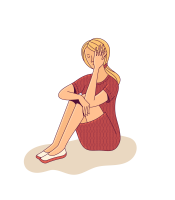Grief can result from numerous significant life events, including death or divorce, or from trauma such as natural disaster. Each person’s experience with grief varies.
Feelings Of Loss
Grief can be defined as the collection of emotions we experience following loss. Although most commonly associated with sadness, other feelings that can make up grief include shock and numbness, denial and anger, as well as preoccupation with the deceased. Maladaptive behaviors such as drinking too much or substance abuse may occur with some individuals. Grief can often leave us exhausted and emotionally drained, making everyday tasks much more challenging than before.
When someone close to us dies unexpectedly, we are often shocked at its suddenness and can be paralyzed with disbelief over what has transpired. Although at first it may feel as if we are hallucinating their passing away, death is real and permanent. Taking time to come to terms with such news takes longer still; birthdays and anniversaries may trigger feelings of shock, numbness and disbelief.
At first, grief can bring intense sadness. Feelings such as emptiness may occur as part of our emotional process to mourning someone close. While this feeling can be distressful and difficult, it should also be seen as part of normal grieving processes.
At times, we may feel angry or even hatred towards those we lose through death, and may blame ourselves or feel guilty over decisions we did or didn’t take that contributed to their death. However, it is important to remember that death does not serve as punishment, and it is very unlikely that we could have taken steps to prevent their passing.
Disorganization and confusion are part of the grieving process, making it hard to eat or sleep. We may withdraw from friends and family, or become overly preoccupied with memories of those who have passed.
Even during difficult experiences, we move through stages of mourning until ultimately reaching acceptance. While each grieving experience differs greatly between individuals, grief typically follows its own course.

Guilt
People suffering from unresolved guilt often become restless and anxious. Their behavior may include becoming overly possessive or constantly apologetic, but guilt can typically be alleviated through confronting and accepting it.
At times, guilt may stem from childhood trauma such as abuse or neglect. At other times, it could be in response to social pressures or cultural expectations. For instance, some cultures teach children they must always be perfect or they will be punished. Similarly, some may believe they must grieve in certain ways or follow certain timelines during the grieving process. They may be trying to adhere to a grieving protocol for their culture.
Grief guilt occurs when people believe they should have done something to prevent a loved one’s death. This phenomenon is commonly known as survivor’s guilt and can often follow after their loved one passes.
Survivor’s guilt can be an effective motivator, prompting individuals to acknowledge the responsibility they bear for their actions and behaviors. But sometimes this guilt leads to more anxiety, as it forces people to evaluate whether there was anything they did that caused the death, or how they might have prevented it.
On occasion, an individual may feel guilty because they think they aren’t grieving enough. Perhaps they feel sad, angry, or tough enough to bear the loss. There’s no right or wrong way to grieve; everyone’s process varies.
Unresolved guilt can have serious repercussions for the individual’s ability to function and complete daily tasks, from isolating themselves from family and friends, to altering eating and sleeping patterns. Physical symptoms, like rapid heart rate or stomach upset, may affect an individual at any time.
Sometimes guilt may be related to an underlying mental health condition; in these instances, seeking professional assistance from a therapist will help identify and address its source. Furthermore, therapists provide essential guidance during grief processes.
Anger
Anger is one of the primary reactions associated with grief. While anger is a healthy response to feeling hurt or mistreated, when expressed inappropriately or felt frequently and intensely it can become problematic and disrupt relationships, or harm physical health (increase blood pressure for example). If this anger becomes destructive to relationships or physical wellbeing, professional intervention should be sought immediately.
Unhealthy expressions of anger include swearing and yelling or placing others in danger. Anger can lead you to blame other people for your problems or seek revenge against them. By being aware of what triggers your anger, it may become easier to manage it.
Anger can be caused by both external events like traffic jams, and internal factors like believing you should have known about something that didn’t occur, or believing someone is intentionally hurtful to you. Anger can also build over time until something triggers it all at once and causes it to boil over. This is likely to happen to anyone that has not developed their own personal management protocol.
Anger can be an understandable and even helpful emotion, but when out of control or lasting too long it becomes problematic. Anger may lead to physical symptoms like headaches, high blood pressure and decreased immunity system function.

Anxiety
Depression, anger and guilt are common emotions following loss. However, anxiety may also be part of the grieving process for some people. Anxiety is defined as a feeling of dread or foreboding which manifests both physically and mentally; from feeling that everything is wrong, all the way to specific fears such as death or accident. Anxiety may induce some of the physical symptoms mentioned previously.
Some individuals’ fear associated with loss can develop into an actual phobia. For example, if someone you love was lost in a car crash, driving may become unbearable and develop into an intense fear. Unfortunately, when dealing with grief, it is easy to fall into a cycle of anxiety that leads to avoidance-based behaviors.
Grief may also lead to existential dread, an overwhelming sense that nothing matters or life has no purpose. It can be challenging to manage this feeling on its own, so be willing to accept professional help if necessary.
At times it’s also possible to experience both grief and an anxiety disorder concurrently, particularly if we already struggle with anxiety or have had previous episodes. Both emotions can put significant strain on us; so it is crucial that we take care in managing ourselves during this process. Someone can do this by getting enough rest, healthy eating, and surrounding themselves with supportive people.
Coping With Grief
Elisabeth Kubler-Ross popularized what has come to be known as the five stages of grief theory in 1969. Although these five steps have become linear steps people must go through when experiencing loss in a healthy manner, not everyone needs to go through each one or in any particular order. While this framework has proven helpful for some individuals experiencing loss, not all individuals go through all five steps and all five don’t always happen sequentially. Someone going through the grieving process must not feel obligated to formally pass though specific stages.
Initial responses to sudden and unexpected losses typically include shock, numbness and denial. One may refuse to believe their loss is real or permanent. When this stage passes, anger and irritability often follow, as one realizes they can no longer escape reality. Some individuals may even feel guilty and regretful over actions or failures they believe contributed to causing the loss in question.
Once grief begins to subside, some individuals experience happiness again. This could be a signal from their deceased loved one wanting them to move on with life. As an alternative, it could indicate they need assistance from loved ones during this phase. An individual’s belief system will determine the validity of these senarios.
Rituals can help individuals cope with grief in various ways, including attending memorial services and visiting the gravesite. Some also create their own ceremonies as ways of remembering loved ones who have passed on, while spending time alone is also comforting. Your friends and family should remember that your self care is important during this time.
Grief is an inevitable part of the human experience, and it is essential to acknowledge, understand, and navigate through it with compassion and support. By embracing our emotions, seeking help when needed, and allowing ourselves the time and space to heal, we can find solace and hope amidst the pain. Remember, you are not alone in your grief, and there is always light at the end of the tunnel.
Content listed below may contain affiliate links.
